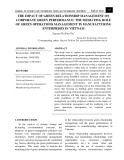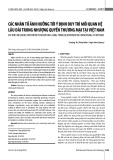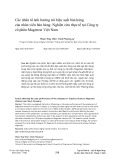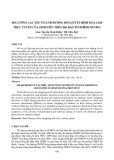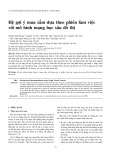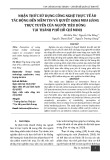
P-ISSN 1859-3585 E-ISSN 2615-9619 https://jst-haui.vn ECONOMICS - SOCIETY Vol. 60 - No. 11E (Nov 2024) HaUI Journal of Science and Technology
17
RESEARCH ON FACTORS AFFECTING THE INTENTION TO BUY CLOTHES VIA LIVESTREAM: THE MEDIATING ROLE OF TRUST IN THE SELLER
Truong Thi Thuy Ninh1,*, Do Thi Bich Ngoc1 DOI: http://doi.org/10.57001/huih5804.2024.339 ABSTRACT The
study was conducted to demonstrate the factors affecting the
intention to buy
clothes via livestream among university students in Hanoi.
The research was conducted by collecting primary data through surveys,
resulting in 241 valid questionnaires that were coded, cleaned, and processed
using SPSS and AMOS software. The results indica
te that the influencing
factors include: livestream quality (1); seller’s
reputation (2); interactivity (3);
and language (4). Among these, livestream quality, seller reputation,
and
interactivity have a positive impact on trust in the seller. The mediating
variable, trust, is the strongest factor affecting purchase intention, followed
by language and livestream script. However, language does not impact trust
in the seller. This s
tudy reinforces and refutes hypotheses from previous
research and identifies new factors that contribute to academic knowledge.
Additionally, it provides optimal and effective solutions to help KOLs and
businesses improve their operational efficiency. Keywords: Intention, interactivity, livestream script, trust, seller reputation.
1Hanoi University of industry, Vietnam *Email: ninhttt@haui.edu.vn Received: 21/5/2024 Revised: 10/7/2024 Accepted: 28/11/2024 1. INTRODUCTION Today, the e-commerce field is a young industry and is on the rise in Vietnam. In particular, when consumers switched their shopping habits from in-person to online shopping when the Covid 19 epidemic broke out, it became a lever to create incredible growth numbers for the e-commerce industry. Vietnam in recent years. In addition, according to a report by market research company Asia Plus [1], the most popular products sold online are fashion items, accounting for 39% (including clothes, accessories, handbags,…). Thus, we can see that Vietnamese consumers mainly shop online for fashion products. Along with that, the development of e-commerce platforms and social media channels has made online sales businesses increasingly popular and more influential. Livestream is a form of online sales that is no longer new to Vietnamese consumers. It has become an increasingly popular and popular trend in the sales field, when this feature is used by ecommercial platforms such as Shopee, Tik Tok shop... integrated into its platform. This has helped businesses effectively create opportunities to reach and interact directly with customers. Because, livestream gives viewers authenticity, increasing trust in the seller as well as trust in the product. At the same time, during each livestream session, e-commerce platforms continuously launch discount codes to attract and stimulate customers to shop. So, in general, businesses are quite successful when applying this form of sales. Therefore, purchasing behavior on livestream is becoming a trend among Vietnamese consumers. According to statistics from major e-commerce platforms Shopee and Lazada, the trend of shopping on livestream has increased many times compared to normal days, because of the convenience and positivity of shopping right at home. combined with real-time online interaction between sellers and buyers, is attracting great attention from consumers. Consumers can experience products and receive detailed information from sellers in a direct and authentic way. This direct interaction leads to a higher level of engagement, creating an interactive and personalized shopping experience where consumers are not just passive recipients of information but also take an active role during the purchasing decision process. Research on this topic has also attracted many scholars recently. In the study by Thao and Minh [2] on

ECONOMICS - SOCIETY https://jst-haui.vn HaUI Journal of Science and Technology Vol. 60 - No. 11E (Nov 2024)
18
P
-
ISSN 1859
-
3585
E
-
ISSN 2615
-
961
9
"Trust and intention to shop through television channels", the results confirmed that when consumers have trust in television shopping channels. Their buying intention will be more positive. Many domestic studies have also shown that product quality, delivery service, price, website quality, promotional activities, participation of similar groups, appearance of famous guests, Ad host, engagement, visual image, entertainment, and professionalism all have a positive influence on consumer trust. Foreign studies have also found many positive factors that affect customer trust, such as expertise, after-purchase support services, persuasion ability, livestream schedule, and quality interactivity, information accuracy, entertainment, information relevance, visual image, professionalism, uniqueness, reputation and popularity of the seller. In addition, research by Schlosser et al. [3] has shown that trust is a strong factor affecting consumers' purchasing intentions, and the higher their trust, the higher their purchasing intentions. Other studies have also shown that good technology and quality of experience, along with information usefulness and stimulation, are all positive factors that influence customer purchase intentions. Through research on Google Scholar, the research team found that the number of studies related to factors that promote clothing shopping behavior through livestreams and the role of sellers for students is quite limited. Recognizing the gap that exists in previous research, the role of sellers in promoting the buying behavior of consumers in general and students in particular has not been clarified. This topic attempts to fill the research gap by focusing on the role of the seller, in the context of investigating factors influencing students' clothing purchasing behavior via livestream, by examining the impact How does the seller's reputation, interactivity, quality of the livestream, and preparation of the livestream script and language affect trust, thereby affecting the buyer's intentions and behavior. To achieve this research goal, the study tries to answer the following research questions: First, what factors about the seller affect the trust of shoppers via livestream? Second, what is the impact of trust on the intention to buy clothes through livestream? Finally, how do seller factors affect the intention to buy clothes via livestream? This article is structured into 5 parts, after the introduction is the theoretical basis and research hypotheses, the third part is the research method, the next part is the research results, and the final content of the article is a discussion of the research results. 2. THEORETICAL BASE AND RESEARCH HYPOTHESIS 2.1. Intention to buy clothes via livestream Intention is a factor used to evaluate the likelihood of performing a behavior in the future. According to Ajzen [4], intention is a motivational factor that motivates an individual to be willing to perform a behavior. Therefore, Delafrooz et al. [5] said that "online shopping intention is the consumer's ability to make purchases via the Internet". Thus, in this study, the research team understands that Intention to buy clothes through livestream is the consumer's ability to definitely perform clothing shopping behavior through livestream. 2.2. Trust in the seller Faith is a psychological state that people have when they trust or believe in something, someone, or an idea that they consider to be true or trustworthy. On social networking platforms, through livestreaming, sellers can create trust for buyers to have a strong impact and play an important role in promoting customer buying behavior. Online trust is related to consumer perception which can be the quality from the seller, the website in providing truthful information and meeting expectations which leaves the buyer impressed and recognizing the product. Trust will be increased by the likeability of the seller and the perceived similarity (shared interests, demographic and personality characteristics) that the buyer perceives about the seller [6]. 2.3. SOR theoretical model The SOR model is a model built based on the theory of environmental psychology proposed by Mehrabian and Russell [7] with 3 stages: stimulus, subject, response. This model suggests that arousal signals can activate a subject's emotional and cognitive processes, leading to behavioral responses Donovan et al. [8]. The SOR model is an approach to psychology through the study of specific situations and environments. Moon et al. [9] argue that SOR allows researchers to more closely examine the psychological and socioemotional influences on a behavior. The three basic components of the model include: Stimulus, Organism, and Response. Specifically: Stimulus: This is a factor generated from the environment, creating special effects in forming consumers' perceptions and emotions.

P-ISSN 1859-3585 E-ISSN 2615-9619 https://jst-haui.vn ECONOMICS - SOCIETY Vol. 60 - No. 11E (Nov 2024) HaUI Journal of Science and Technology
19
Organism: Are elements that express consumers' clear emotional states in specific cognitive contexts. Response: Represents consumers' intentional reactions, directed toward achieving their specific goals through specific actions and reactions. 2.4. Research hypothesis Reputation is often considered a factor that contributes to consumer trust in the seller organization [10-12]. Reputation is the degree to which buyers believe that the sales organization is honest and cares about its customers [11]. The better a seller's reputation, the more resources the seller has to build that reputation, the higher the penalty for violating consumer trust, and thus the more trustworthy the seller is perceived to be. According to research by Kahle and Homer [13], in general a brand will be spoken by a celebrity, their brand will be more widely loved and promoted who are not famous. From there, it can be seen that if the seller is a famous person, he will create a reputation to attract buyers to watch the livestream and decide on purchasing behavior. Biswas et al. [14] found that the seller's reputation when participating in livestreaming will have a strong impact on reducing consumers' perceived risk for high-tech oriented products. H1: Seller reputation positively affects customers' trust in sellers on livestream Interactivity includes the knowledge, skills and attitudes of sellers through Livestream. According to Le-Anh et al. [15] also mentioned that knowledge has a positive effect on customer interaction and trust in the product. Rotter [16] believes that people with knowledge and expertise can subtly influence the attitudes and decisions of others in a certain way. Lei et al. [17] showed that interactivity has an impact on consumers' cognitive and emotional states in commerce on social media platforms. Qiu et al. [18] also found that seller interaction on Livestream will impact the trust of customers watching online. The above observation is reinforced by Nguyen Hoai Nam [19]; Chairy [20] also pointed out that interaction is a factor that affects customers' trust in sellers on Livestream. H2: Interactivity positively affects customers' trust in sellers on livestream There have been many opinions given by the authors because each field will have a different perspective. From the perspective of the business field, they all have one thing in common: quality is the ability to satisfy customer needs and expectations about a certain product or service. Livestream is a form of live streaming through which buyers and sellers can interact directly with each other through social networking sites. This form is increasingly popular and developed, chosen by many businesses because of its effectiveness, direct interaction increases customers' trust in products and services. According to Theo Dong et al. [21] has confirmed that the quality of the livestream includes the following factors: information quality, system quality, service quality, telepresence and presence. social presence has a positive impact on customer trust. H3: Livestream quality positively affects customers' trust in sellers on livestream The alignment between the host and the brand/product will help increase customer trust in the seller's reliability and appeal [22]. Chairy [20] also suggests that entertainment value and uniqueness influence consumer trust. Nguyen Hoai Nam [19] confirmed that entertainment plays a positive role in building customer trust. Therefore, the group proposes the hypothesis: H4: Livestream script positively affects customers' trust in sellers on livestream Communication skills or verbal skills are a very important requirement for streamers. Because customers access the product through viewing and listening to the main sound. Streamers use words to convey product information to customers, so how they use language affects customer trust. According to a study by Sabo et al. [23], it has been confirmed that words have an impact on the listener's emotions. Streamers use emotional language to influence customer trust by tapping into consumers' emotional motivations and creating emotional connections. Thus, based on the above documents, we can see that using the right language at the right time and with the right audience will help streamers become confident, attractive, and professional, creating trust with customers and stimulating customers. At the same time, it reveals the factors and trends that impact language on customer trust, helping to increase interaction and promote customer purchasing behavior. H5: Language positively affects customers' trust in sellers on livestream Within the scope of this study, trust is understood from the perspective of individuals participating in economic activities and is considered in a commercial

ECONOMICS - SOCIETY https://jst-haui.vn HaUI Journal of Science and Technology Vol. 60 - No. 11E (Nov 2024)
20
P
-
ISSN 1859
-
3585
E
-
ISSN 2615
-
961
9
context. Therefore, according to the definition of Rousseau et al. [24], trust is described as follows: "Trust is a psychological state that includes the intention to accept vulnerability based on positive expectations towards the intentions or conduct of others". Trust will be increased by the likeability of the seller and the perceived similarity (shared interests, demographic and personality characteristics) that the buyer perceives about the seller [25]. Research results by Thao and Minh [2] as well as Wang et al. [26] have shown that the higher consumers' trust, the higher their intention to shop through social media channels - the higher the image. H6: Trust in the seller positively affects the intention to buy clothes via livestream Intention is a factor used to evaluate the likelihood of performing a behavior in the future [27]. When an online seller has a high reputation, it increases consumer trust, thereby reducing the perceived risk associated with the product, and consumers will make confident predictions about the products [28]. Besides, according to Friedman and Friedman [29], three sources of endorsement are widely used in advertising: celebrities, experts, and typical consumers. Indeed, some Internet entrepreneurs post customer stories and testimonials on their websites to corroborate their reputations and invest in website banners to stock Quelch and Klein [30] Lohse and Spiller [31] speculate that store reputation will influence perceptions of the online site. From there, it can be seen that if the seller is a famous person, he will create a reputation to attract buyers to watch the livestream and decide on purchasing behavior. H7: Seller reputation has a positive impact on the intention to buy clothes via livestream In the context of live streaming, trust can refer to viewers' trust in the content creator, the brand involved, and the quality of the content provided [32]. When broadcasting live, streamers can introduce images of products in a variety of ways including trying on clothes live [38]. These visual images help consumers see product details and even feel that they are present there [33]. Research by Sokolova and Kefi [34], analyzing four beauty makeup bloggers, found that physical attractiveness did not have a significant impact on purchase intention, while reputation and quasi-social interaction association increases consumers' purchase intention. H8: Interactivity has a positive impact on the intention to buy clothes via livestream Quality is one of the factors that consumers are concerned about, according to Nguyen Thao Nguyen and Le Thi Trang [35], in the study "Factors affecting consumers' intention to buy organic food in Thanh Hoa", has proven that perceived quality affects consumers' intention to buy organic food in the same direction. According to Guo and Sun [36], the quality of the live broadcast session affects purchase intention through perceived information usefulness and stimulation. According to Lee et al. [37], shows that the quality of a livestream, including factors: (1) technology and (2) technology and experience quality, have a positive impact on customer's purchase intention. H9: The quality of the livestream has a positive impact on the intention to buy clothes via livestream Sellers rely on advance preparation of the scenario by arranging appropriate schedules, choosing appropriate times to make it easier for consumers to notice, and influence behavior and intention to buy clothes through livestream more effectively Wang et al. [26]. Besides, according to Guo and Sun [36], arousal positively affects purchase intention. Stimulation is achieved through the seller preparing a livestream script with arrangements mixed with entertainment elements and organizing activities to tap into the psychology of customers choosing to buy the product. The feeling of buying cheap goods will stimulate customers to shop online [33] or when broadcasting live, sellers can introduce products in many different ways [38] to influence customers' purchase intention to increase. H10: Livestream script has a positive impact on the intention to buy clothes via livestream From a sociolinguistic perspective, the language used by streamers affects customers' product purchasing intention. Using polite, clear and friendly language helps buyers clearly understand information about the product being sold and builds a good relationship between seller and buyer. In addition, the availability of product information and prompt responses to consumer inquiries and on-time delivery also influence the message sent to customers when purchasing products online [39]. This research shows that language and communication play an important role in influencing buyers' purchasing intention. From the interactive experience of "external perception - scene language" and "internal perception - communication language", the two mediating elements of presence perception and sensory stimulation contact is chosen to build the consumer structure. Language is used to describe or create a particular landscape, environment or experience, a process that combines the

P-ISSN 1859-3585 E-ISSN 2615-9619 https://jst-haui.vn ECONOMICS - SOCIETY Vol. 60 - No. 11E (Nov 2024) HaUI Journal of Science and Technology
21
consumer's perception and interaction with the external environment, along with the use of language, specific language to convey or describe those landscape elements. This can affect consumers' emotions and purchasing intentions. Internal sensing - communication language is the interactive process between the consumer's perception and processing of internal information (such as emotions, thoughts, consciousness) with language used to convey a message, promote emotions, or create interaction with consumers. From a communication perspective, the most basic activity of a salesperson in this exchange process is communication. Therefore, successful selling depends on interpersonal communication. Customers and salespeople are classified according to their communication style as task-oriented, interaction-oriented, or self-oriented. Research [40] suggests that a task-oriented salesperson combined with an interaction-oriented customer will not result in a purchase, but sales will increase if the customer is task-oriented or self-directed. So, for salespeople to be successful, they must recognize the customer's communication style and adjust their communication style appropriately to interact with customers. H11: Language has a positive impact on the intention to buy clothes via livestream Streamers have a positive impact on trust. Research shows that a streamer's reputation and popularity significantly boost trust in the streamer, and the streamer's product mix positively moderates this relationship. Dai and Cui [41] found that the reputation and popularity of live streamers significantly impact trust in them. Tran Thach et al. [42] confirmed that trust is the most influential factor in students' purchasing decisions for fashion products via livestream. Chan and Asni [43] study also demonstrated that trust in the product and the seller determines purchase intention. The authors suggest that trust mediates the relationship between seller reputation and purchase intention. H12: Trust plays a mediating role in the relationship between seller reputation and the intention to buy clothes via livestream In Wang et al. [26] study, trust mediates the relationship between a seller's persuasive ability and purchase intention. Chairy [20] research found that consumer trust, influenced by interactivity, affects purchase decisions, particularly for fashion products. Nguyen Hoai Nam [19] study also showed that interactivity boosts customer trust, influencing their purchase intentions. The authors hypothesize that trust mediates the relationship between seller interactivity and purchase intention. H13: Trust plays a mediating role in the relationship between interactivity and the intention to buy clothes via livestream Research by Dong et al. [44] investigated the impact of livestream quality on consumers' trust and purchase intention regarding green agricultural products. They proposed a system to evaluate livestream quality factors, including (1) information quality, (2) system quality, (3) service quality, (4) telepresence, and (5) social presence. The results show that these quality factors influence consumers' trust and purchase intention. Similarly, research by Lee and colleagues [37] found that livestream quality, specifically (1) technology and (2) technology and experience quality, impacts customers' purchasing intentions. They emphasized the role of trust in the relationship between livestream quality and purchase intention. Based on these findings, the authors proposed the following research hypothesis: H14: Trust plays a mediating role in the relationship between livestream quality and the intention to buy clothes via livestream Wang and colleagues [26] found that the livestream schedule impacts purchase intention, with trust as a key mediator. Chairy [20] model explored how livestream characteristics influence trust and, subsequently, audience engagement, highlighting factors like entertainment and originality. Su and Lee [45] noted that engaging and fun livestream scripts create unique viewer experiences. Zhang and colleagues [46] emphasized that professional broadcasters use original content and clear language to interact with consumers. Casaló et al. [47] argued that original and trustworthy content helps influencers connect with their communities. Tong [48] highlighted that the uniqueness of live broadcasting boosts customer trust and interest. Based on these insights, the research team proposes a new hypothesis: H15: Trust plays a mediating role in the relationship between livestream script and the intention to buy clothes via livestream The study “Emotion words affect eye fixations during reading” by Scott et al. [49] shows that emotional language impacts eye focus and can influence purchase intention through trust. Chairy [20] research highlights that trust significantly affects buyer attitudes and

![Kế hoạch hoạt động Marketing thương hiệu [chuẩn nhất]](https://cdn.tailieu.vn/images/document/thumbnail/2025/20251102/babyzun486877@gmail.com/135x160/14481762151982.jpg)

